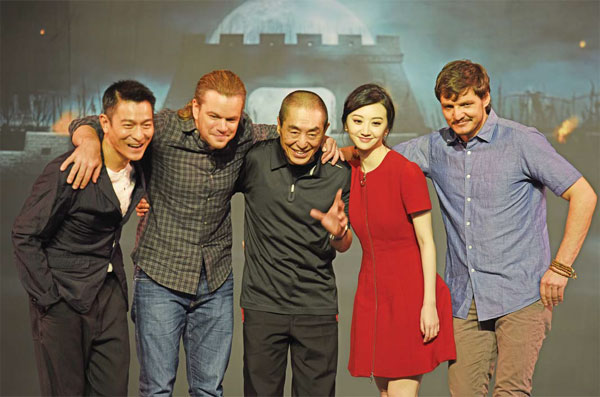When race matters

Whether the casting is historically accurate or racially blind, market forces are more likely to dictate Hollywood screen choices
Zhang Yimou's new film, The Great Wall, has whipped up a storm over the casting of white actor Matt Damon in the lead role. The trailer opens with Damon, and even though it squeezes in many other stars, the Hollywood actor remains the marquee name.
Some in China felt slighted that a major Chinese film would have a US actor as the male lead.
| Zhang Yimou (center) with cast members of The Great Wall in Beijing. From left: Andy Lau, Matt Damon, Jing Tian and Pedro Pascal. Photos Provided to China Daily |
| Christian Bale in the lead role in The Flowers of War, a Chinese film about the Nanjing massacre of 1937. |
Actually, this is more of an American film that hired a Chinese director and features a story set in China.
But the Chinese response was less about the film, which few will have seen, than about the sentiments left over from the recent South China Sea arbitration ruling.
Across the Pacific Ocean, Asian-Americans also protested the casting choice. I can totally understand why they reacted so strongly because they are fighting for job opportunities.
A similar controversy erupted in the early 1990s when the musical Miss Saigon transferred from the West End to New York's Broadway. Asian-American actors felt they had been short-changed when Jonathan Pryce was cast as the Engineer, a French-Vietnamese hustler, a role he had been performing for years on the London stage.
The level of racial sensitivity varies from country to country when it comes to screen or stage casting, and it varies from era to era. On the Chinese screen, Han Chinese have often played Tibetan roles, and in recent years as more Tibetan talent has emerged, they have also taken roles that are 100 percent Han.
There is no political innuendo whatsoever. It is usually the style of the film that determines whether casting should be racially authentic.

On the Chinese stage, we have always resorted to the practice of "white face" - Chinese actors putting on a fake big nose and makeup to pretend to be Caucasians. Chinese dancers also paint their skins black to perform African dances. There is no mockery or caricature involved.
And that's why most Chinese would not bat an eye when they hear Asian-Americans protesting "yellow face" (white actors playing Asian roles).
Of course, the reasons are quite different: China had white face because we could not afford to hire Caucasian actors back then, so it's now out of vogue since there are so many Chinese-speaking Westerners working in China, including professional and amateur actors.
But the United States had yellow face because Hollywood feared that central parts of the US would not accept an Asian face on the big screen, not because Asian actors were not available or too expensive.
For all the progress that's been achieved in the past 50 years, Hollywood is still not ready for an Asian lead, especially male leads, with a few exceptions such as Jackie Chan in action movies or others in period pieces set in China, such as The Last Emperor.
Given the state of globalization, this is a deplorable situation. But I believe it's based on the bottom line rather than on artistic or political consideration.
Zhang's previous work, The Flowers of War, saw Christian Bale cast in the lead, a role that required a Caucasian actor or otherwise the story would not hold. The character was an outsider in Nanjing, and it was crucial that he provided that perspective.
In The Great Wall, Damon plays a European mercenary soldier, so it seems the role was also tailor-made for a white actor. Of course, European actors can argue that they are more qualified because Damon may have an American accent at a time when the US did not even exist - the story is set in the Song Dynasty (960-1279).
I don't think all roles should be Chinese simply because the Great Wall is a Chinese icon. The monster that appears in the trailer is not Chinese, or of any country. As a matter of fact, this is a fantasy film, which means you'll have to suspend logic many times when watching it.
Even when a film is rooted in real history, there are many ways to argue for or against any casting decision.
For example, if a major Chinese star had been cast as the Engineer in Miss Saigon, audiences in China may have been offended. He is a bad guy, so they may have said, "Are you implying Chinese are all this bad?"
Wang Luoyong, a Chinese actor, did actually assume the role in the Broadway production. He launched his career in China after leaving New York.
In recent decades, racially blind casting has been employed to send a political message or simply to jolt audiences out of complacency.
In the 1997 TV version of the musical Cinderella, the prince was played by an Asian, and had a white father and black mother. In the 2006 Chinese film Battle of Wits, a black actor makes an appearance in the China of 2,000 years ago.
African-Americans have been waging a long and gradually successful campaign in Hollywood for more opportunities in good roles. Asian-Americans have fared much worse.
Ultimately, it's specific names, not necessarily their race, that determine the market scope of a film.
If you put Will Smith, Denzel Washington and Morgan Freeman in the three principal roles, it will be accepted as a heavyweight global film; if you cast three unknown black actors, it would be perceived as a film that serves only the black community.
Political correctness will not change Hollywood's casting department, but those folks listen to the market.
When a film targets the US alone, there is little chance Asians will be given the lead. But when a movie makes half of its box office from Asian countries, it will bend to the forces of the market.
That's why more Chinese stars are making cameo appearances in big Hollywood pictures. Some of them may be elevated to meatier roles down the road.
And just as Hollywood favors certain Asian actors, Chinese audiences have also shown their own tastes in foreign stars that may not correspond to their status in their countries. That's something Hollywood may need to scrutinize pretty soon.
And the equation may even be reversed when hinterland China becomes the tail that wags the dog of the world film business. For one thing, Chinese have shown a preference for movies with characters who look like them.
Hollywood needs a little push, but eventually it's the sound of the cash register that changes things.
(China Daily Africa Weekly 08/12/2016 page22)
Today's Top News
- Crossing a milestone in the journey called Sinology
- Chinese, Russian media outlets urged to enhance cooperation
- Where mobility will drive China and the West
- HK community strongly supports Lai's conviction
- Japan paying high price for PM's rhetoric
- Japan's move to mislead public firmly opposed
































